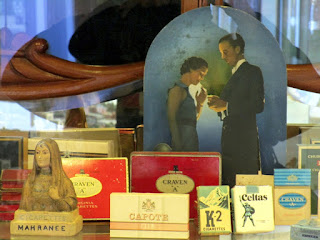Over at Fr Thesis's church yesterday the Society of King Charles the Martyr were enjoying themselves celebrating the entry into paradise (we must surmise) of Bd Charles Stuart in 1649, rather to my surprise as neither has the good Fr ever expressed any fondness for the Royal Martyr in the past, nor has his church had any link with the SKCM, as far as I know. When I raised this with him he merely commented mildly that 'the stars were aligned in its favour'; the stars in question, I supposed, being King Charles's Wain. A friend-of-a-friend once took a Methodist acquaintance to the SKCM's annual Memorial Mass, which always used to be held at the Banqueting House; at one stage in the proceedings the Nonconformist minister leant over and whispered 'What happens next, do they sacrifice a cockerel?'
Forget Gothic versus Roman vestments, Sarum versus Western rite, or even an all-male priesthood versus letting women in, or any of the other things Anglo-Catholics have disagreed about: the real dividing line, I think, is your attitude to the Royal Martyr. For some of my friends he represents a dream of Catholic Anglicanism, pious, hierarchical, and reactionary. Of course they know it's loopy, and its very loopiness adds to the sense of naughty fun involved in observing the cult of King Charles (you find the same sort of thing among Goths and vintage enthusiasts). Meanwhile I can't even pretend to take it at all seriously. In Enid Chadwick's My Book of the Church's Year she has a drawing of St Charles standing serenely, regally, and unhistorically tall next to the chopping block, with the caption 'Charles I, the White King. He died to save the English Church'. I can never help thinking at this that I'm not at all sure that was why he died: he died because he was an idiot, albeit a berk of a principled brand. His best modern biographer, Leanda de Lisle, records that the legend that the black pall of Charles's coffin was covered with snow as it was carried to St George's Windsor, giving rise to that title of 'White King', derives from 'a professional liar'. The old Book of Common Prayer was more interested in making sure people repented of the blood-guilt of attacking the King rather than in his own virtues, and the observance of his death was struck out of the calendar in 1859; the English Missal of course omitted him, as that dutifully followed Roman models. The Alternative Service Book listed him, but it took the Franciscans' Celebrating Common Prayer to come up with a slightly strained Collect referring to the royal martyr 'praying for his enemies' as the chief mark of a holy life. I have no idea where that came from. About as good a stab at it as you can make, though. I can usually ram my tongue far enough into my cheek to be able, when the occasion arises, to read it without choking.
Charles's feast day is, technically, today rather than yesterday, displaced to the 29th by the Fourth Sunday of Epiphany. As I was preparing to leave after the 8am mass I listened to the Roman Catholic congregation we share the church with limbering up and their pianist practising what was clearly 'He Who Would Valiant Be', so I congratulated Fr Jeremy on celebrating St Charles's Day by including a hymn written by that doughty Puritan and Republican John Bunyan. Who is also in the Anglican calendar, a symbol of heavenly reconciliation if ever there was one. But not even we have included Oliver Cromwell.

































